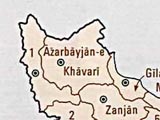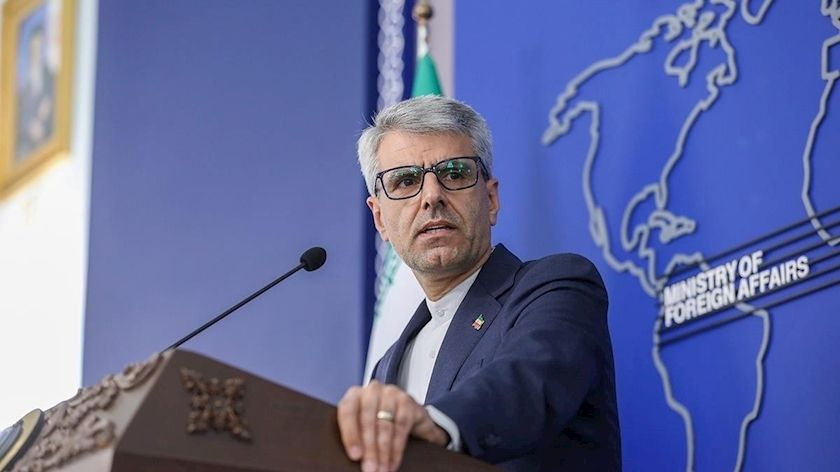|
|
TODAY.AZ / Society
Washington Institute for Near East Policy : "Iranian Azeris: A Giant Minority"
06 June 2006 [21:13] - TODAY.AZ

Iranian security forces cracked down violently on the demonstrators, killing at least four people (Azeri nationalists claim twenty dead), injuring forty-three, and detaining hundreds of others. These developments indicate brewing discontent among Iran's Azeri population and should be studied for their implications for U.S. and Western policy toward Tehran.
The Iranian regime's effort to put out this ethnic brushfire by closing the Tehran-based Iran newspaper and arresting its editor as well as the ethnic Azeri cartoonist quickly escalated to the usual strongarm response as the Iranian Revolutionary Guard Corps' anti-riot units and Basij militias attacked the Azeri protesters. Iranian security forces cracked down on tens thousands of offended Azeris, who took to the streets in Tehran and in the major northwestern Iranian cities such as Tabriz, Urumieh, Ardebil, Maragheh, and Zenjan. The intelligence service launched a massive detention campaign, rounding up relatives of Azeri Turks previously jailed for Turkish nationalism.
The Iranian deputy interior minister for security affairs, Ali Asghar Ahmadi, admitted that the demonstrations in Tabriz were far more than a mere protest against a newspaper insult. In fact, there is much resentment in Iranian Azerbaijan about the region's economic and social difficulties. That resentment is fed by the attitudes of ethnic Persians toward ethnic Azeris—an attitude well captured in the phrase “Torki khar” (Turkish donkey), used by Persians in reference to Azeris, whom they regard as the "muscle" of the Iranian economy to be dominated by Persian "brains".
Azeri Turks, concentrated mainly in the oil-poor northwest of Iran (along the border with Turkey, Armenia, and Azerbaijan), make up an estimated one-fourth of Iran's population of 70 million. Azeris often claim a population share close to 40 percent, a number that includes ethnic brethren such as the Turkmen, Qashgais, and other Turkic-speaking groups. Unlike other ethnic groups in Iran such as Sunni Kurds and Arabs, the Azeri Turks are Shiites like the Persians. Divided from their kin in Azerbaijan by the 1828 Treaty of Turkmanchai, which gave northern Azerbaijan to Russia (that part of Azerbaijan gained independence after the collapse of the Soviet Union in 1991) and southern Azerbaijan to Iran, the Azeris' role in the Persian government was significantly weakened when the Pahlavi dynasty came into power in 1925. Contact between the Azeri areas of Iran and the Soviet Union were limited until Soviet forces occupied northern Iran during World War II. In 1945, at Soviet instigation, an Azerbaijan Democratic Republic was proclaimed in Iranian Azerbaijan. It lasted only until Soviet forces withdrew a year later; in the aftermath, some thousands of Iranian Azeris were killed.
Much as did imperial Iran, the Islamic regime has downplayed the ethnic differences between Persians and Azeris. Despite the fact that influential figures in the establishment, such as Supreme Leader Ayatollah Ali Khamenei, are of Azeri descent, the mullahs did not hesitate to crack down hard on Azeri Turkish nationalism, using heavy weapons to put down a 1981 uprising in Tabriz and summarily executing hundreds of Azeris.
Azeris have had mixed relationships with other Iranian minorities. Kurds, who make up around 14 percent of Iran's population, do not have particularly good relations with ethnic Azeris; several cities in western Iran, such as Urumieh and Mako, are inhabited by both Kurds and by Azeri Turks. In the last decade, the ethnic majority of the Azeri Turks in some areas close to the border with Turkey has been diluted by immigration of Kurds. The attitudes of the Turkic-speaking ethnic Turkmens, who live in the part of Iran near the independent republic of Turkmenistan, are unclear.
The last fifteen years has seen a boom in nationalist publications for Iranian Azeris and growing interest in both Turkey and the former Soviet republic of Azerbaijan. A considerable number of Iranian Azeris watch Turkish television broadcasts now available via satellite; this has increased their knowledge of Turkey as well as the Anatolian dialect of Turkish.
This revival led to the creation of a new organization, the South Azerbaijan National Awakening Movement (Gamoh), by literature professor Mahmudali Chohraganli. After winning election to the Iranian parliament in 1995, Chohraganli, whose own father was once tortured by the Shah's secret police for Turkish nationalism, was not allowed to take his seat. Gamoh opposes what it calls "Persian chauvinism," demanding more cultural rights for Azeris, and a future Iranian government with a federal structure resembling the United States in which Azeris can have their own flag and parliament. Gamoh's proclaimed support for self-determination, secular government and a pro-Western orientation does not sit well with Tehran. Its apparent popularity has put Gamoh squarely on Tehran’s radar screen.
Gamoh is run as a secret organization inside Iran. Its members, including Chohraganli, who was jailed for two years and released in 1999 after falling seriously ill, are often jailed or harassed by Iranian security forces. Denied visas by both the Turkish and Azerbaijani governments, Chohraganli was allowed to travel to the United States in 2002. In April 2005, bodies of two Gamoh members were found floating in the Aras River, the boundary between Iran and Azerbaijan. In September 2005, the Iranian government blamed Gamoh for the shooting of a government official in Urumieh; Gamoh denied involvement. In March 2006, several Gamoh members attended the Second World Azerbaijanis Congress in Baku. Following that congress, several Gamoh members were arrested in Tabriz, and in April the Iranian Azeri newspaper Navid Azerbaijan was banned.
The plight of Iranian Azeris is followed closely by their kin in Azerbaijan and Turkey. But both the Azerbaijani and Turkish governments take care not to damage their sensitive relations with the Iranian government. Turkey recently stopped allowing a Chicago-based Azeri television broadcaster, Gunaz, from using its satellite link. Gunaz is known for its virulent opposition to Iran's Islamic regime and its separatist attitude since it went on the air in 2005. On the other hand, Ankara has given Chohraganli permission to visit Turkey soon, and Gamoh has an open presence there.
Azerbaijan is also walking a fine line between sympathy for the Iranian Azeris and its economic and political interests with the Islamic regime. Tehran recently consented to the opening of an Azerbaijani consulate general in Tabriz, Iran's largest Azeri-majority city. With annual bilateral trade volume of $600 million, Iran is a major trading partner of and an investor in Azerbaijan; Tehran also offers humanitarian aid to the almost one million Azerbaijanis internally displaced from Nagorno Karabakh after Armenia occupied that part of Azerbaijan in 1993. Yet the Azerbaijani public is largely sympathetic to the plight of Iranian Azeris. "Baku, Tabriz, Ankara. Where are the Persians? Here we are!" chanted the Azeri Turks in Baku this week as they protested the brutal treatment of their ethnic kin by Iranian security forces. Many Azeri nationalists are interested in uniting "North" Azerbaijan (the former Soviet republic) with "South" Azerbaijan (the Iranian provinces).
Ethnic tensions in Iran have been on the rise with unpredictable results, involving not just Azeris but also Kurds, Arabs, and Baluchs. The government of President Mahmoud Ahmadinejad has only made these problems worse.
By Ali M. Koknar
Ali M. Koknar is the owner of AMK Risk Management, a private security consultancy with offices in Washington, DC, and Turkey specializing in counterterrorism and international organized crime.
/www.washingtoninstitute.org/
URL: http://www.today.az/news/society/26974.html
 Print version
Print version
Connect with us. Get latest news and updates.
See Also
- 15 October 2025 [18:07]
Large-scale drug smuggling attempt foiled on Azerbaijan–Iran border - 15 October 2025 [11:03]
Baku hosts international conference on energy, food, and climate security - 14 October 2025 [12:21]
Tens of Thousands of new jobs planned in Garabagh and East Zangazur - 14 October 2025 [11:02]
Azerbaijani Army prepares weapons and equipment for autumn-winter operation - 14 October 2025 [10:20]
30th Caspian Construction Week opens with focus on reconstruction and development - 14 October 2025 [09:42]
SOCAR conducts apecialized well control training for TPAO engineers - 13 October 2025 [18:39]
Drug smuggling attempt from Iran to Azerbaijan by UAV foiled - 13 October 2025 [12:21]
Azerbaijan, Pakistan, and Turkiye hold third trilateral parliamentary meeting - 11 October 2025 [14:20]
Conference participants on missing persons visit Zangilan as part of Baku Dialogue - 11 October 2025 [11:05]
Mud volcano erupts in Baku’s Garadagh district [VIDEO]
Most Popular
 Azerbaijan set to handle 15 mln tons of rail cargo annually
Azerbaijan set to handle 15 mln tons of rail cargo annually
 Mustafayev: Trilateral dialogue strengthens Azerbaijan–Iran–Russia partnership
Mustafayev: Trilateral dialogue strengthens Azerbaijan–Iran–Russia partnership
 Afghanistan-Pakistan clashes leave scores dead amid rising tensions
Afghanistan-Pakistan clashes leave scores dead amid rising tensions
 Between Washington and Middle East, Azerbaijan’s role gains new weight
Between Washington and Middle East, Azerbaijan’s role gains new weight
 Trilateral consultations in Baku highlight regional cooperation agenda - Iranian FM
Trilateral consultations in Baku highlight regional cooperation agenda - Iranian FM
 Why couldn't Azerbaijan not be in Sharm el-Sheikh
Why couldn't Azerbaijan not be in Sharm el-Sheikh
 US will send Ukraine Tomahawks if war unresolved
US will send Ukraine Tomahawks if war unresolved
